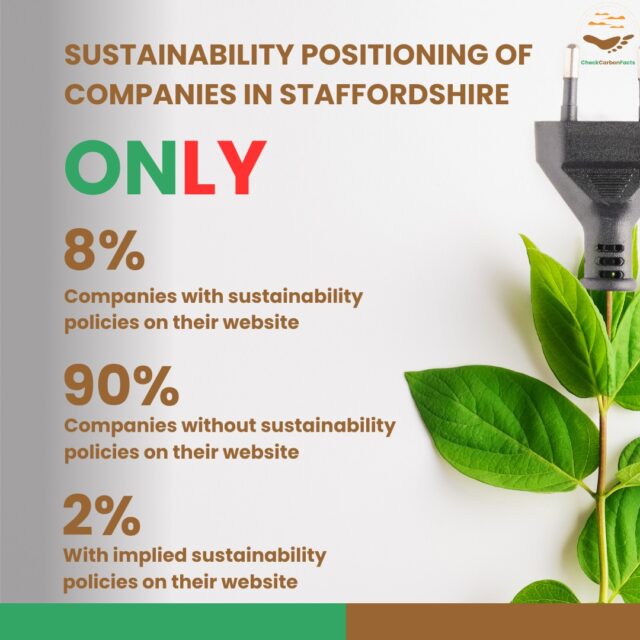The demand for companies to demonstrate their climate-friendliness and embrace sustainability is rising as the global community continues to increase efforts to mitigate the impacts of climate change. The ambitious efforts to achieve Net Zero are at the forefront of this sustainability movement.
Companies that commit to achieving net-zero emissions aim to balance the amount of greenhouse gases produced with an equivalent amount removed from the atmosphere, effectively minimising their carbon footprint. This aligns with global climate goals and signifies a proactive approach to mitigating environmental impact.
A report released by CheckCarbonFact in September 2023 sheds light on the state of affairs among Staffordshire companies, revealing both commendable efforts and concerning gaps in policy and practice.
Sustainability Goes Beyond Moral Obligation
To move the needle toward the net zero objective, companies are required to exhibit their dedication by formulating and openly sharing a well-defined policy stance on their websites. However, it goes beyond a mere proclamation of sustainability and the issuance of eloquent policy statements; there is a crucial need to actively incorporate these principles into both their supply and value chains. Failing to do so exposes them to the risk of engaging in greenwashing, where their commitment may be perceived as insincere or superficial.
In addition to being in line with the pressing need for environmental and planetary preservation and remediation, this approach to climate action and sustainability also reduce risk and put businesses in a position to capitalise on opportunities to create enduring value. These benefits include access to grants, trading schemes, tax exemptions, and other incentives for businesses.
As part of its contributions towards this objective, CheckCarbonFact conducted an analysis of companies registered with the Staffordshire Chambers Of Commerce. The goal was to assess and highlight the climate action and sustainability policies of companies listed in the Staffordshire Chambers of Commerce, as a sample to provide insight into the state of companies in the UK.
The report aimed to explore the positioning of these companies on climate action and sustainability, revealing an imperative shift in the business landscape towards environmental consciousness.
The analysis established concerning trends of low visibility and publication of such policies. Arising from this, a key recommendation was for companies to proactively articulate and effectively communicate their climate-friendly practices to mitigate risks, enhance ethical standing, and leverage potential benefits in the context of environmental and societal impacts.
Report Snapshot: a Stark Reality in the Current State of Affairs
The report evaluated some 500 businesses that are members of the Staffordshire Chamber (SCC) of Commerce in terms of their sustainability strategies. The study sought to ascertain if the companies publicly published ESG (Environmental, Social, and Governance), Sustainability, Net-Zero (explicit de-carbonization commitments), and separate Environmental policies.
The most startling discovery is that most companies do not have environmental, climate, and sustainability practices publicly presented on their websites. Only 8% of the 500 companies sampled made these policies public, indicating an openness to being forthright about their dedication to sustainable practices.
On the reverse, an astounding 90% of the companies have not provided any visible publication of sustainability, environmental and climate action policies on their websites or other online spaces.
On the other hand, only 2% of the companies were found to have an implied sustainability stance that was not clearly made public on their websites, placing them at risk of being accused of greenwashing.
The report additionally conducted a detailed analysis specific to each sector, aiming to offer a more nuanced comprehension of the business landscape. The manufacturing sector takes the forefront in terms of published policies, acting as a trailblazer for others to emulate. In close pursuit are the Real Estate and Financial/Insurance services sectors, indicating a rising awareness of environmental and sustainability standards within the built environment and financial industries.
These divergences among sectors not only underscore the evolving nature of the business landscape but also signify the trajectory of financial trends, suggesting a growing emphasis on eco-friendly practices within industries.

Implications for Companies: A Call to Action
The absence of publicly available climate action and sustainability policies of companies raises concerns that extend beyond the ethical realm. It not only jeopardises the moral standing of these organisations but also leaves them susceptible to a host of operational challenges, reputational risks, diminished competitiveness, and potential lapses in regulatory compliance.
The repercussions of inadequately articulated or undisclosed policies create an environment conducive to greenwashing – a misleading practice that has the potential to erode public trust and negatively impact the company’s financial performance.
In contrast, embracing sustainability is not solely a moral obligation; it represents a strategic manoeuvre that opens up opportunities for companies to capitalise on various benefits associated with compliance. Companies actively engaged in climate-friendly practices position themselves to access a spectrum of advantages.
These may include opportunities like securing lucrative procurement deals, gaining access to grants, participating in emissions trading schemes, enjoying tax waivers, and other enticing business incentives.
Conversely, failure to integrate sustainability into their operations amplifies environmental risk quotients, exposing companies to adverse climate impacts and inviting potential backlash from critical stakeholders, including discerning customers and vigilant investors. In essence, the choice to embrace sustainability is not only a moral imperative but also a savvy business move with the potential to fortify a company’s resilience and reputation in an ever-evolving and conscientious marketplace.
A Call to Action for Staffordshire Companies
In the face of the global imperative to mitigate climate change, companies must go beyond mere lip service on sustainability. The report emphasises the importance of integrating key tenets of climate action and sustainability into the very fabric of a company’s value and supply chains. This is not just about good policy documents but a deliberate effort to enact sustainable practices.
In conclusion, the CheckCarbonFact report serves as a wake-up call for companies in Staffordshire. Embracing sustainability is no longer a choice but a business imperative. The consequences of inaction are not just ethical but financial, with potential costly repercussions. The path forward is clear – Staffordshire companies must act now to secure a sustainable and resilient future.
About CheckCarbonFact
CheckCarbonFact is a social accountability platform for climate action by citizens, companies, and governments. It is a UK-based enterprise with a focus on engendering collective responsibility and mutual accountability in climate change mitigation and adaptation. The vision of CheckCarbonFact is to mobilise collective action in the race to save the planet; and the mission is to guard against greenwashing, empower sustainable consumerism; and address climate inequities and inequality. CheckCarbonFact is a member of the Staffordshire Chambers of Commerce.
Found it interesting and would like more in the mail?




